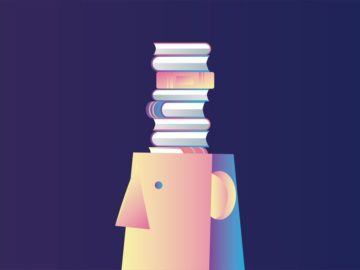Angus Fletcher in Smithsonian:
 Shortly after 335 B.C., within a newly built library tucked just east of Athens’ limestone city walls, a free-thinking Greek polymath by the name of Aristotle gathered up an armful of old theater scripts. As he pored over their delicate papyrus in the amber flicker of a sesame lamp, he was struck by a revolutionary idea: What if literature was an invention for making us happier and healthier? The idea made intuitive sense; when people felt bored, or unhappy, or at a loss for meaning, they frequently turned to plays or poetry. And afterwards, they often reported feeling better. But what could be the secret to literature’s feel-better power? What hidden nuts-and-bolts conveyed its psychological benefits?
Shortly after 335 B.C., within a newly built library tucked just east of Athens’ limestone city walls, a free-thinking Greek polymath by the name of Aristotle gathered up an armful of old theater scripts. As he pored over their delicate papyrus in the amber flicker of a sesame lamp, he was struck by a revolutionary idea: What if literature was an invention for making us happier and healthier? The idea made intuitive sense; when people felt bored, or unhappy, or at a loss for meaning, they frequently turned to plays or poetry. And afterwards, they often reported feeling better. But what could be the secret to literature’s feel-better power? What hidden nuts-and-bolts conveyed its psychological benefits?
After carefully investigating the matter, Aristotle inked a short treatise that became known as the Poetics. In it, he proposed that literature was more than a single invention; it was many inventions, each constructed from an innovative use of story. Story includes the countless varieties of plot and character—and it also includes the equally various narrators that give each literary work its distinct style or voice. Those story elements, Aristotle hypothesized, could plug into our imagination, our emotions, and other parts of our psyche, troubleshooting and even improving our mental function.
These literary inventions can alleviate grief, improve your problem-solving skills, dispense the anti-depressant effects of LSD, boost your creativity, provide therapy for trauma (including both kinds of PTSD), spark joy, dole out a better energy kick than caffeine, lower your odds of dying alone, and (as impossible as it sounds) increase the chance that your dreams will come true. They can even make you a more loving spouse and generous friend. You can find detailed blueprints for 25 literary inventions, including step-by-step instructions on how to use them all, in my new book, Wonderworks: The 25 Most Powerful Inventions in the History of Literature. And to give you a taste of the wonders they can work, here are eight basic literary inventions explained, starting with two that Aristotle unearthed.
More here.
